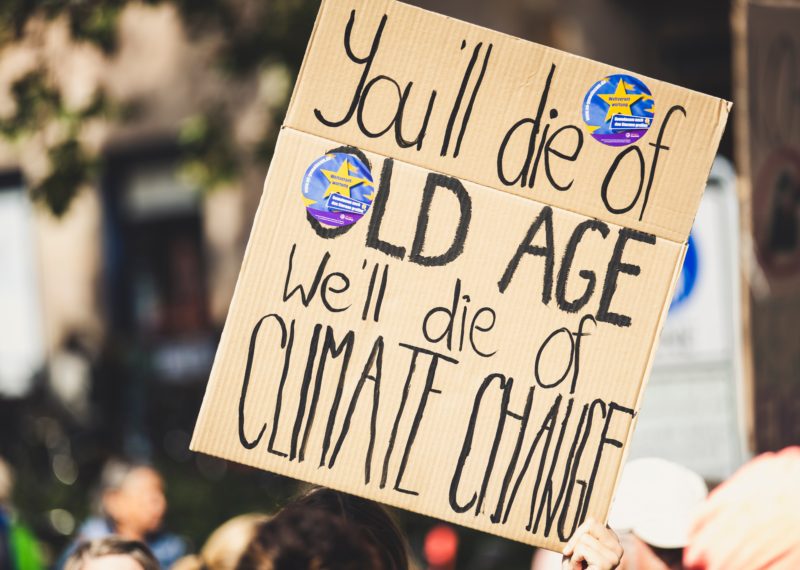If you find yourself despairing over recent reports that young people will live through “unprecedented” heatwaves, droughts, floods and other climate disasters, you’re not alone.
Nearly six in 10 young people, aged 16 to 25, are “very or extremely” worried about climate change, according to a study released earlier this month; four in 10 said those concerns made them hesitant to have children. And for the first time ever, a majority of Americans say people in the US are already being harmed by climate change today.
“What I believe is lacking in the broader public awareness around climate change is how you work with the feelings that are a natural response,” says Leslie Davenport, a therapist and author of All the Feelings Under the Sun: How to Deal With Climate Change.
Angst over a warming planet is warranted, but there is plenty you can do to cope. We spoke with Davenport, along with climate activists Daniel Sherrell and Sophia Kianni, about how to manage climate anxiety.
1. Stop doom scrolling.
Yes, it’s important to arm yourself with facts, but there’s such a thing as too much information. “At the end of the day, if you are well-informed about the state of our climate, and you know what we need to do about it, then that 24/7 access to information is not really helping you,” says Sophia Kianni, climate activist and college student.
“There’s a temptation to withdraw into the digital world as the physical world and the ecological world collapses,” says Daniel Sherrell, climate activist and author of Warmth: Coming of Age at the End of Our World. “Don’t.” Sherell says he unplugs by going for a 30-minute walk without his phone each day.
2. Remember: it’s OK to feel this way.
“If you’re scared, sad, confused with what’s happening, or by governmental inaction, it’s a natural, healthy response,” says Davenport. “It says, ‘I’m paying attention, it matters to me, I’m empathetic, I care.’” She says acknowledging those feelings is the first step to channeling them productively.
3. Find your community…
“Find your political home,” Sherrell advises. “Absent any sort of politics, finding your people can turn into a kind of funeral, where you’re just holding each other through the grief. I have found it enormously valuable to remember that there’s a whole movement, growing every year, mobilizing around the world, to try to see us through this crucible, and bring from it a more just, equitable world.”
To learn about youth-led climate justice groups, click here.
4. …but don’t be afraid to go it alone.
“If there are specific things in your community that you think are wasteful and bad for the environment, then you don’t need to wait for someone else to take initiative. Start your own,” Kianni says. For her, that meant starting Climate Cardinals, which enlists volunteer translators to make information on climate change more accessible to non-English speakers. But for others, that might mean cleaning up litter on a local hiking trail—or calling your local representative, she says.
5. Take care of yourself…
“Some people feel [climate change] is so urgent, that they can’t take a break,” Davenport says. “But you can’t stay in it for the long haul, unless you’re replenishing yourself in the process. If we’re too overwhelmed, or we’re too stressed, we either lash out, or we check out. If we learn [to] incorporate self-care, we’re more effective.”
6. …but also call your representative.
“Right now, the most important climate bill—the $3.5 trillion reconciliation bill—in the history of this country by several orders of magnitude is on a knife’s edge,” Sherrell says. “There are definitely a bunch of GenZers living in the districts of the corporate democrats who are putting that in jeopardy. So that is an obvious way to plug in.” and tell them what you think.
7. We don’t know how bad it’s going to get—and that’s alright.
“Fatalism is the easy posture of people that don’t want to look reality in the face,” Sherrell says. “There’s a whole range of how this can go: from 1.5 degrees Celsius to 4 or 5 degrees. Every tick of the thermometer along that spectrum spells the difference between life and death for millions of people. It’s not over. We’re going to have to keep fighting for the people, the things and the values we love, forever.”
Danielle Renwick writes for Nexus Media News, a nonprofit climate change news service. Follow her @daniellerenwick


